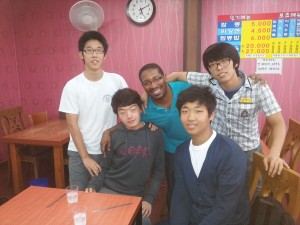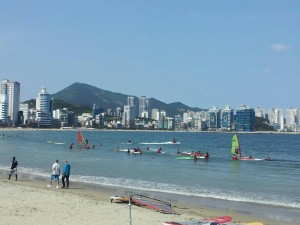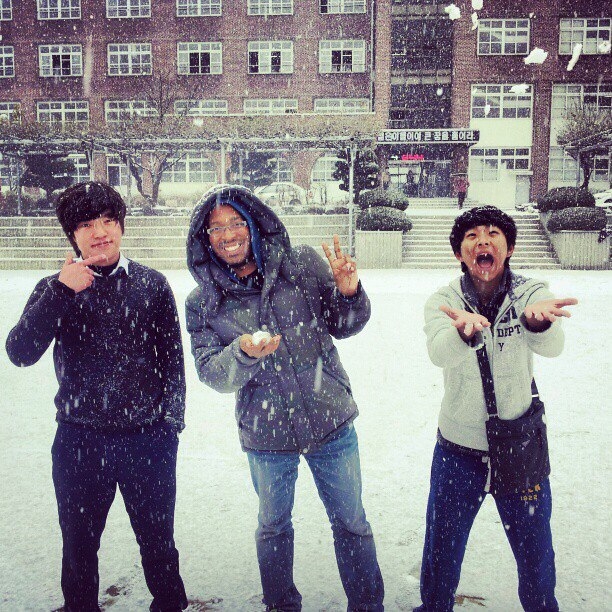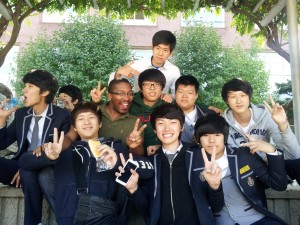Reach To Teach Interviews Chris Richards, an EPIK Teacher in South Korea

American ESL teacher Chris Richards arrived in Asia in February 2012. He is an EPIK teacher in South Korea. Chris teaches high school students at DalSeo Technical High School in Daegu, South Korea. To learn more about Chris’s adventures abroad, check out his photo essays and stories on his blog at Texan in South Korea. (Don’t forget to check out our page on working teaching English in South Korea for more information on how you can become an English teacher in South Korea.)
1. Hi Chris. Thanks so much for agreeing to share your story with us. Can we start with you telling us a little about yourself?
I am originally from Houston, but I grew up in Austin, Texas. While studying in my Master’s program, I decided take my first international trip to Europe (Switzerland, France and Germany) with our study abroad program. I absolutely loved it! After returning, I did another study abroad trip to Costa Rica and I knew then, that international travel was for me. After completing my M.A., I got a job teaching public speaking at community college in Houston. Due to some changes in the economy, I was unable to continue working there, so I took the opportunity to travel. I decided on South Korea because I had two friends who taught here and highly recommended it. It has been one of the best decisions I’ve ever made. I recently just accepted a position to teach at a university here, which I am very excited about!
2. How have you enjoyed teaching in South Korea to date?
Although it has been a rough challenge, I have enjoyed teaching here very much. The education system here is a lot different than the US. I was placed a very unique type of school-an all-boys technical high school. In South Korea, a technical school does not focus on academics. Students at my school are here to learn a trade (architecture, machinery, auto-mechanics, electricity, and electric engineering). There is very little interest in English, or other subjects for that matter. It took me several months to connect with my students, but once I did, the learning doors opened.
3. What advice can you give to new teachers interested in teaching in South Korea?
Be open. Be flexible. Be patient. Have fun! Deciding to just up and move 7,000 miles away from your friends and family is not easy. Korea is a different world and things don’t always function the way you expect.
Be flexible-Korea is a last-minute culture, literally! It is not uncommon to spend a lot of time on lessons, only to walk in class and your co-teacher tells you class is cancelled. Or, perhaps at 4:28pm (work ends at 4:30pm), they tell you there is a staff dinner you must attend to, but you already have plans. Things are forever changing, so just go with the flow. Sometimes, it works out quite nice!
Be patient-The first couple of months in Korea can be very frustrating. It takes a while to adjust to a new culture, new school and new life. In the beginning you’ll want to strangle your students, but if you just be patient, things get much easier and less frustrating. Also, Koreans are shy. It is very difficult for them to speak out in class, so be patient with them. Keep a warm smile on your face. You’d be surprised how much courage it takes a student to just say “nice to meet you”.
Have fun-Just as it says, have fun! Go out and mingle with your new friends. This is a great way to bond with others and explore your new city. Take weekend trips and the most important part of having fun in Korea is being open. While most people’s goal here is to save money, don’t be too concerned with saving that you miss out on great opportunities.
4. Can you tell us about a particularly powerful moment in your classroom?

5. What are the positive and negative aspects of living in South Korea?
Positive-you meet people from all over the world. I enjoy having an international network of friends. Your salary is pretty good and the cost of living is cheap. It’s actually cheaper to eat out than go grocery shopping sometimes. Korea has a big drinking culture, so if you’re a drinker, you’re in the right country. You’re able to travel across Southeast Asia fairly cheaply. Life here is very easy going, so you don’t so stressed. Traveling around the country is cheap.
Negative-you’ll meet some Koreans who are downright rude to you. They express their feelings of not wanting you here. Your living and work situation is the luck of the dice. Some people get here and have nice apartments in great locations and some people have tiny shoeboxes. Some people get placed in good schools and some do not. Korea is a pretty conservative country, so it can difficult for those who are very open minded and pretty liberal. If you have big feet or are a big person, you’ll have a hard time shopping.
6. Have you had the opportunity to travel much in South Korea or in Asia?

I haven’t written much on my blog, but I intend to write more this upcoming year.
7. Is there anything else you’d like our readers to know about?
Enjoy living abroad. This is such a unique experience and some people don’t maximize their experience over here. Also, to be honest, most people who come here to teach think that ALL students are eager to learn and walk into class with their pencils in their hand. It’s not like that. Yes, there are students who want to learn English, but there are plenty who do not. Don’t let that frustrate you. Kimchi is actually pretty good. If you don’t eat all of your rice, expect Koreans to look at your weird.
8. Do you have any favorite blogs or websites about South Korea that you’d like to share with our readers?
#KikinitinKorea is a blog by someone in Korea who best describes our experience by posting these clips. Before I came to Korea, it didn’t make much sense. Now that I’m here, it’s pretty accurate.





